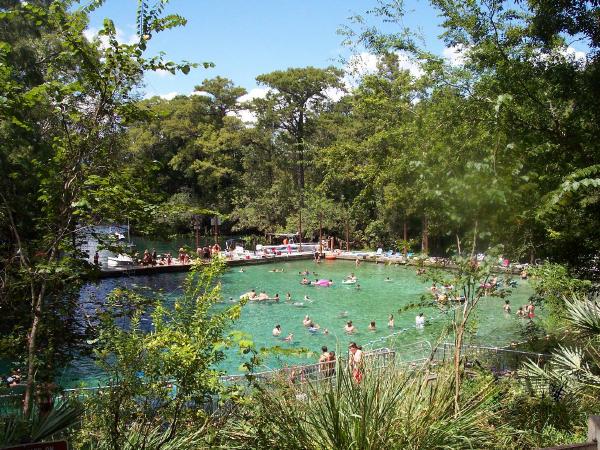Located on 204 acres along the Suwanee River, Fanning Springs State Park is home to a 2nd
magnitude spring that produces almost 65 million gallons of water each day, The
crystal clear outflow from the spring runs about 450 feet before emptying into
the Suwanee River. A secondary spring, named "Little Fanning Spring" is located
in a wooded area about 500 feet south of the main spring. It also discharges to
the Suwanee River.

Fanning Springs is named after Colonel Alexander Fanning, and a fort named in
his honor that was built during the second Seminole War in the early 1800's. No
trace of the fort remains. The Park site along the river was once the location
of a landing for riverboats carrying cotton and other goods down the Suwanee
River from local plantations to the Gulf of Mexico. In the early 1900's,
railroads replaced the ferryboats. And the track for the Atlantic Coastline
Railroad crossed the property on its route from Cross City to Chiefland. The old
railroad right-of-way has since been repurposed as the Nature Coast State Trail.
The main spring at Fanning Springs State Park is a popular site for swimming,
snorkeling and scuba diving. The crystal clear waters are 72 degrees (F) all
year long. And in the winter it is common to see manatees that swim up river to
the warm waters of the spring. The spring contains a shallow sandy bottom in
places, along with a viewing platform.
A wheelchair accessible boardwalk extends from the swimming area at the spring
to a gazebo on the Suwanee River. The Park also has a 3/4 mile densely canopied
nature trail that leads through forested areas of hardwood trees and pines. A
picnic area with volleyball court and playground is nearby. Dogs are allowed on
a leash, but not in the rental cabins area. A kayak launch area is available for
those bringing their own watercraft. There is also an off-site concessionaire
with rental kayaks available.
There are five rental cabins at the Park, each with screen porch, kitchenette,
and central heat and air conditioning. Dishes, kitchen utensils, and linens are
provided with the cabins. A two night stay is required on weekends. The Park
also allows pimitive tent camping for hikers and kayakers. Overnight parking at
primitive campsites is not allowed.
Activities & Facilities
Playground

Picnic shelter

Dogs allowed

Short hiking trails

Long hiking trails

Paved bike trails

Mountain bike trails

Swimming

River or lake kayaking

Motor boating

Tent camping

Cabins

Fishing